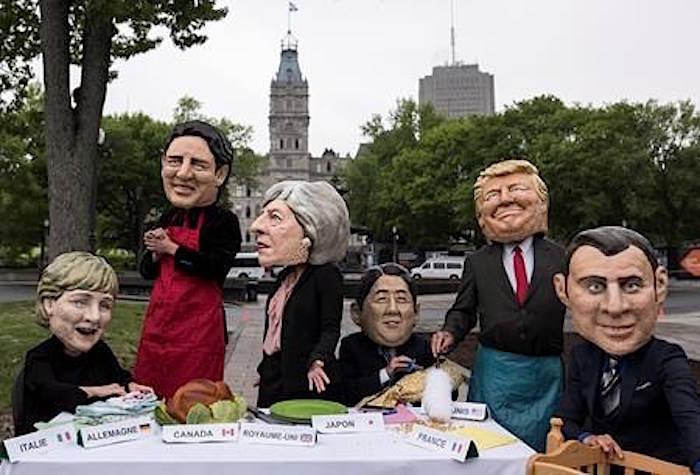Quebec City’s historic district looked as though business owners were preparing for a mini hurricane to blow through the cobblestone streets on Thursday, as several storefronts were barricaded with plywood in anticipation of anti-G7 protests.
So far, demonstrations were calm.
Stores that were open for business vastly outnumbered the shuttered facades. But the police presence in the old city was noticeable — squad cars drove through the area and uniformed officers kept watch at different spots across the neighbourhood popular with tourists and locals alike.
As the afternoon sunshine drove away the morning rain clouds, gallery owner Esther Garneau welcomed potential patrons despite the fact the large, glass window facade of her store was covered with plywood.
“I’m staying open with the barricades,” she said. “I’m more worried about the nighttime.
“My artists were worried. The artwork here is made by hand and not machine — you can’t just re-make it the next day. I decided to put up the plywood to make them feel better because they were really worried.”
While the G7 summit will be held 140 kilometres northeast of Quebec City in the resort town of La Malbaie, diverse groups including unions, aid organizations and anti-capitalists are expected to protest in the provincial capital.
The number of detention spaces that have been opened up around the Quebec City-area in anticipation of protests is leading human rights groups to worry about the intentions of security forces.
Representatives from Amnesty International and Quebec’s league for civil liberties say they’ve been told by police that officers aren’t looking to make any mass arrests.
“But with all the security measures that have been put in place, it’s leading us to believe there is a gap between the discourse and the reality,” said Genevieve Paul, head of the francophone Canadian branch of Amnesty International.
Her group and Quebec’s league for civil liberties are sending 44 observers to the protests, which are likely to continue well into Saturday night.
Paul said prisoners in Quebec City’s provincial jail have been transferred to other detention centres in order to liberate about 230 spots for protesters.
“There are agreements with other prisons to transfer inmates to make even more room (in Quebec City’s jail),” Paul said.
Police have erected a temporary detention centre near Quebec City’s Victoria Park, and another temporary jail in a town a few kilometres north of La Malbaie. Paul said police have also made room to detain people if need be in the main police station of Saguenay.
Nicole Filion, with Quebec’s league for civil liberties, said she worries about the possibility of mass arrests, the conditions of detainees inside the temporary jails, and the potential misuse of crowd-control weapons by police, such as rubber-ball blast grenades.
Cyndi Pare, spokeswoman for Quebec City’s police force, said it would be “inappropriate” to speculate in advance about police actions.
“We can’t establish whether there will be mass arrests or not. It’s impossible to predict how (protesters) will act and how police will react.
“Police are trained to use force with flexibility and discretion.”
Prime Minister Justin Trudeau was asked Thursday in Saguenay, Que., if he had a message for protesters in Quebec City.
“In a country like Canada, I find it extremely important that people are able to express their agreement or disagreement with politics, individuals, their concerns,” Trudeau said.
“It must obviously be done with respect and, above all, security. And we will ensure that protesters and citizens and G7 participants are safe.”
The last time Canada hosted a similar event, the G20 summit of 2010 in Toronto, officers arrested hundreds of people and kept them in conditions Amnesty International described as inhumane.
While no major protests have been planned in the G7 host town, groups opposed to the summit held a news conference in La Malbaie on Thursday to denounce what they called the “undemocratic” free speech zone that has been set up to accommodate them along the bank of the St. Lawrence river.
They said the fortified enclosure and security checkpoints would be intimidating to protesters, and noted that the site was some distance away from where the leaders will be meeting.
“It’s the free speech zone here, but we’re just preaching in the desert, because in my opinion the G7 leaders won’t really come here,” said Sujata Dey of The Council of Canadians.
Earlier on Thursday, the first of a series of demonstrations and protests kicked off peacefully in the provincial capital.
Staged by aid organization Oxfam, masked activists posing as G7 leaders mimicked household tasks in order to highlight women’s unpaid labour and to push the G7 countries to improve social services such as childcare in order to relieve the burden placed on them.
An actor wearing a papier-mache mask of Donald Trump wielded a feather duster, while a likeness of Justin Trudeau carved a turkey next to laundry-folding Angela Merkel.
Oxfam Quebec director Denise Byrnes said, “I think we have an opportunity this year with Canada’s G7 presidency, which prioritizes women’s equality, to advance on certain issues.”
About 10,000 civil servants who work in buildings in and around Quebec’s legislature have been given Thursday afternoon off as well as all day Friday in anticipation of the discord.
It’s unclear how many stores and restaurants in the old city and surrounding area will close during the summit, but several business told The Canadian Press staying open isn’t worth the risk.
Frederique Gendron, assistant manager of soap store Lush, said that after speaking with the company’s Canadian headquarters in Vancouver, they decided to barricade the store and close it for the safety of the employees.
“It was either hire a security guard or put up plywood,” she said. “It’s just easier to board up the store.”
The Canadian Press



